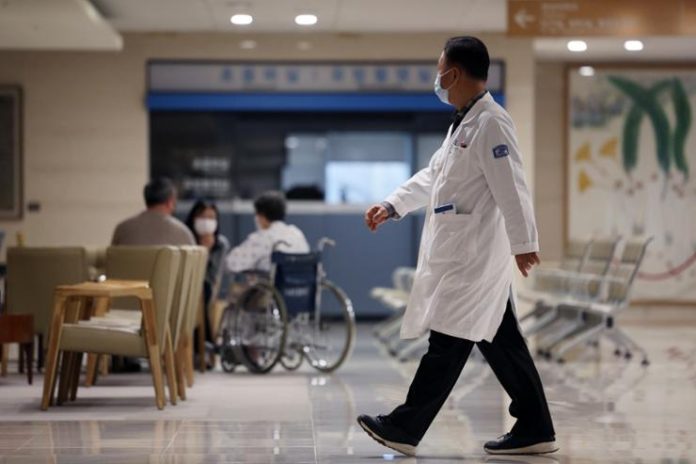Health workers in South Korea walk out in protests on Tuesday, raising concerns about providing medical services, South Korean media reported.
Professors from 40 medical schools as well as private practitioners decided on Tuesday to join a one-day shutdown of services organised by the largest doctors’ group here, the extent of the impact on South Korea’s health care system is still uncertain.
According to reports on Friday citing industry sources, about 43,000 ambulatory appointments face delays if all professors take part in the shutdown of their services. Some doctors will not take part in the strike and will instead fill medical vacancies, widespread disruption remains expected.
In addition to the complete shutdown of medical services on June 18, several emergency committees have also announced indefinite strikes to begin next week. The strike will lead to widespread disruption of health services, longer waiting lists and more delays. Also, all scheduled surgeries may either be postponed or cancelled, depending on how many professors actually leave.
The average daily number of outpatient visits at the country’s so-called Big Five hospitals has fallen since junior doctors walked off the job in the middle of February. Therefore, 8,000 outpatient visits at Seoul National University Hospital, 9,000 at Severance Hospital, 12,000 at Asan Medical Centre in Seoul and 7,000 each at Samsung Medical Centre and Seoul St. Mary’s Hospital, respectively. The average daily number of surgeries at AMC and SMC has been halved from 200 to 100.
Prime Minister Han Duck-soo on Friday demanded that medical professors call off the planned strike, citing constitutional and legal restrictions to protect people’s lives: “A medical professional’s legal responsibility is to protect the lives and health of the people. The trust (that medical professionals have) with patients is the reason and result of their dedication to their profession,” he said during an on-site inspection of SNU Boramae Medical Centre.
The government has also warned of tough measures against doctors who engage in complete closure of services as a collective action, as a possible violation of Section 15 of the Medical Services Act. The law provides that a health care provider cannot, upon receiving a request for medical or maternity care, refuse to provide their services without “any justifiable reason.”
Which parts of healthcare will remain open?
The medical community says patients and their carers cannot experience any chaos as emergency departments and intensive care units will continue to operate, as will the treatment of critically ill hospitalised patients.
Medical professors have set aside certain days for outpatient treatment while other days set aside for research, teaching or other professional activities, which doctors said will not stop all non-urgent medical treatment.
Some doctors said they would continue to provide treatment. The association of medical professors specialising in epilepsy treatment, led by Professor Hong Seung-bong of SMC, said in a statement released Friday that the group has decided not to stop its services.
The Korean Midwifery Hospital Association will continue to provide treatment as some 140 maternity hospitals and clinics across the country will continue to provide care. The Korean Society of Anaesthesiologists also said that doctors needed for major surgeries will provide treatment. The Korean Children’s Hospital Association will offer treatment, saying they “sympathise with the KMA’s struggle” but do not want to leave patients behind.
